Austin Aims to Reduce Waste Through Fix-It Clinics
By Cat DeLaura
Reporting Texas
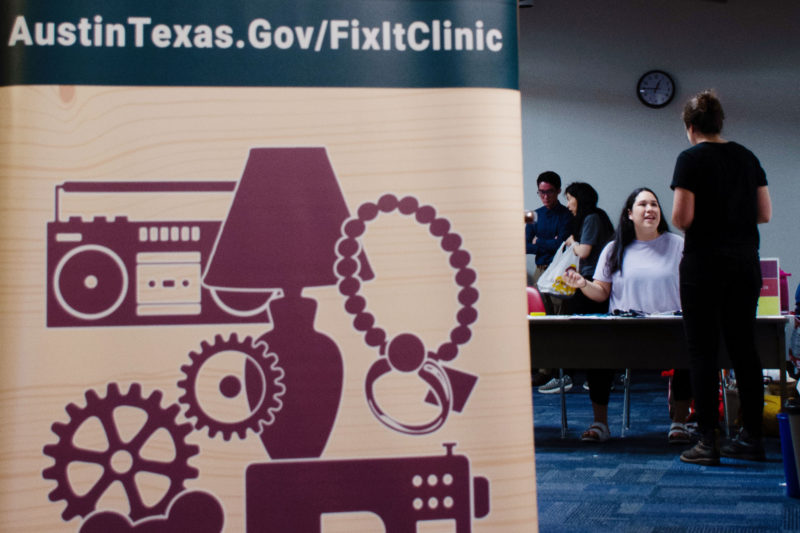
A Fix-It Clinic volunteer greets visitors at the Manchaca Road Branch of the Austin Public Library on Sept. 28, 2019. The clinic’s volunteer coaches teach participants how to repair a variety of broken items. The goal is to educate citizens about the value of repair and reuse, according to the event’s webpage. Hope Lenamon/Reporting Texas
About 50 people bustled around tables covered in sewing machines and half-repaired clothing at the Manchaca Road Branch of the Austin Public Library on the evening of September 28. Several people leaned in as they intently watched volunteer fixers mend torn shirts and disassemble broken fans and electronics.
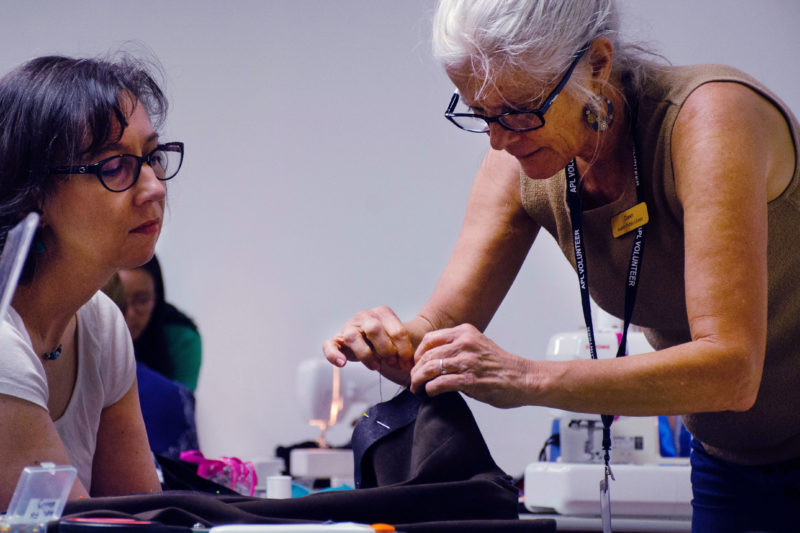
A volunteer coach, right, shows a clinic attendee how to sew a jacket hem at the Manchaca Road Branch of the Austin Public Library. Hope Lenamon/Reporting Texas
One attendee, Austin resident Jay Flaherty, said he has brought his elementary school-aged daughters to at least three such Fix-it Clinics sponsored by the city of Austin.
Modeled after repair cafes in cities around the world, including Tokyo, London and Los Angeles, the clinics are a way for residents to learn how to fix broken household items and encourage them to reuse objects that would otherwise be discarded. Austin Resource Recovery, the city’s waste services program, began the clinics in October 2015.
“What we’re trying to accomplish here is to bring awareness to our disposable society and to try to minimize what we put in the landfill,” Flaherty said.
In December 2011, the city passed the Austin Resource Recovery Master Plan, with the goal to make Austin zero waste by 2040, which means keeping 90% of discarded materials out of landfills. The city set a benchmark goal of 75% zero waste by 2020.
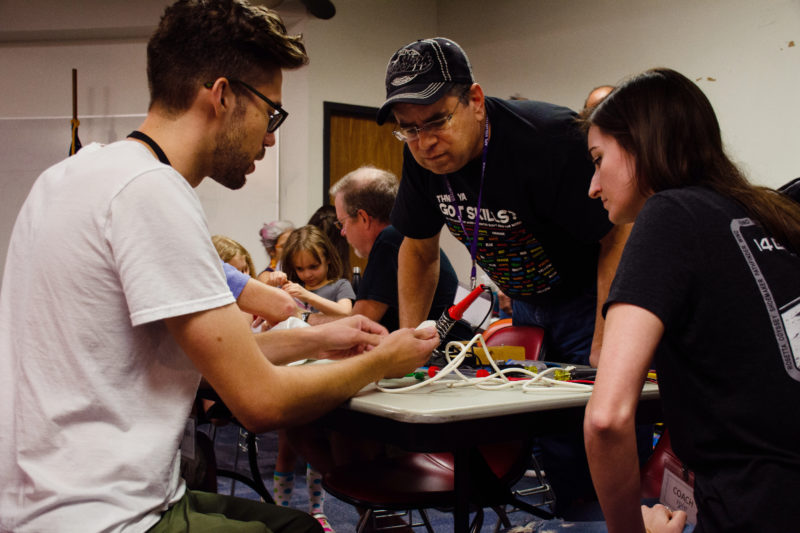
Volunteers teach attendees how to repair household items in hopes of keeping the objects out of landfills. The program is part of the city of Austin’s push to reach a zero waste goal by 2040. Hope Lenamon/Reporting Texas
The backbone of the clinics are fixers, usually experts and professionals who volunteer to help residents learn how to repair items, including clothes, jewelry and electronics.
Kevin Mundt, 58, a systems architect at Dell, has volunteered at several clinics. Once an elderly woman brought in a 1950’s era toaster and blender that she wanted to fix for her boyfriend’s 80th birthday gift, Mundt said. He was so endeared he offered to take the blender home and fabricate a missing part. She picked it up from his house later that week.
“She went away happy as a cloud,” Mundt said. “This is all about keeping stuff out of the landfill … but you’re making someone’s day when you fix something that has sentimental value.”
According to the city of Austin website, more than 1,800 pounds of discarded items have been diverted from landfills because of the clinics. Susanne Harm, spokesperson for Austin Resource Recovery, is hopeful that the program is changing the way people think about waste. Harm also recognizes there is more to be done considering the roughly 200,000 tons of reusable material in landfills according to a 2015 city of Austin waste study.
“It is a really good example of circular economy, keeping products in use rather than in landfills,” Harm said. “We’ve done a ton of work to get people to recycle right, but it’s always a challenge because you’ve got new people moving here all the time, every day.”
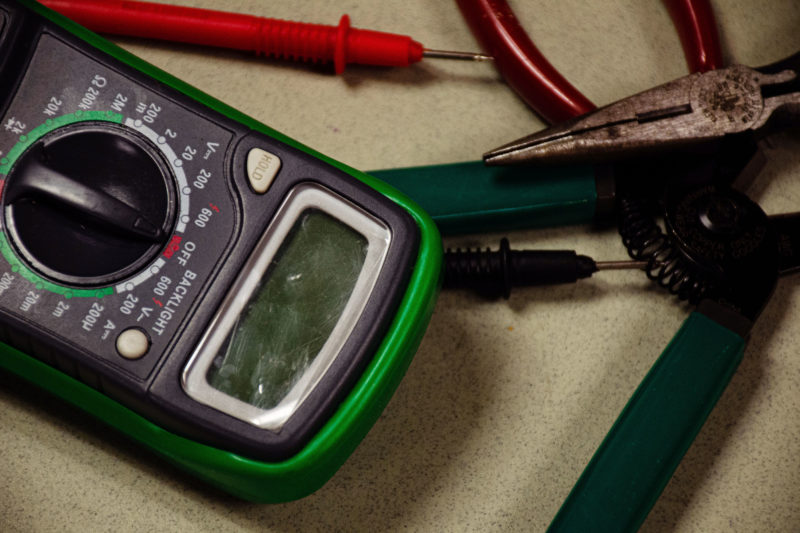
A voltage meter and other tools are available for use by the clinic’s attendees. Hope Lenamon/Reporting Texas
According to the Austin Resource Recovery Master Plan, Austin “cannot achieve Zero Waste solely on government policies and services.” During the past seven years the city has held compost and recycling informational sessions and instituted the Zero Waste Block Leader program, which trains residents to educate neighbors about the city’s zero waste initiatives.
Cindy Frey, 57, is a Zero Waste Block Leader and has attended at least three Fix-It Clinics. She attributes her zero waste mindset to growing up with frugal parents and wishes more residents would embrace zero waste practices.
“It kind of feels a little bit alone,” Frey said, “except for the other Zero Waste Block Leaders.”
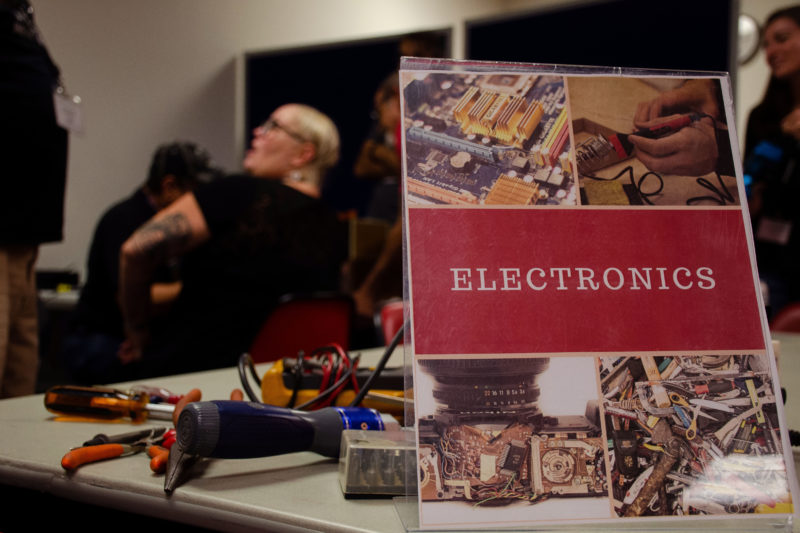
A sign designates the electronics section of a Fix-It Clinic held at the Manchaca Road Branch of Austin Public Library. Other areas included a sewing area and jewelry repair section. Hope Lenamon/Reporting Texas
The determining factor for who attends clinics is location, Harm said. Events at Recycled Reads, a city-run used book store, attract more college students, while clinics held at public libraries attract more families. Clinics usually attract two dozen or more attendees.
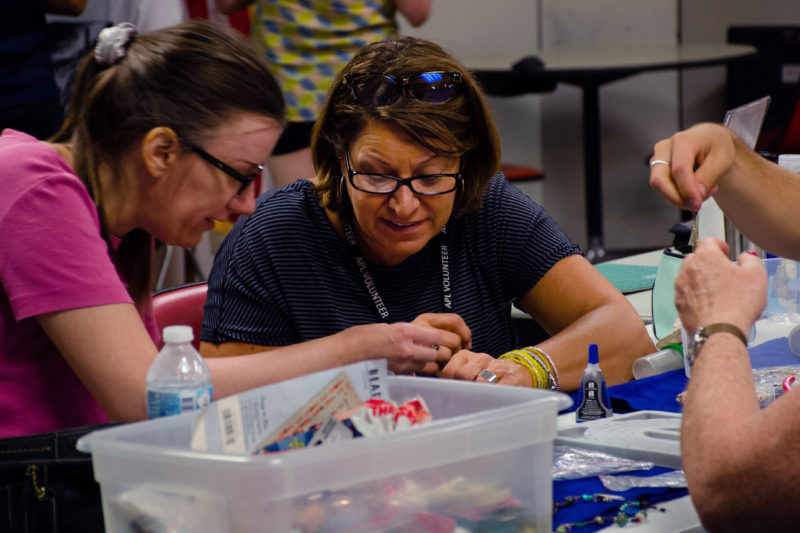
Keena Miller, right, works on a piece of jewelry she brought in for repair. Most attendees find out about the clinics through word of mouth as there aren’t funds to advertise them. Hope Lenamon/Reporting Texas
Due to a lack of funds, Austin Resource Recovery has not been able to widely advertise clinics, instead relying on attendees telling and bringing friends and family, Harm said. In 2019, the city launched the Fix-It Clinic Partnership Program with a goal that private businesses will sponsor clinics throughout the city and reach broader audience.
In July, the clothing store Patagonia became one of the first businesses to host a clinic. Several dozen people attended, said Jessica Hildreth, Patagonia events coordinator.
“It’s too in line with our core values and what we’re interested in anyways to not do it,” Hildreth said. “I’m sure that it’ll be a regular thing here.”
At past Fix-It Clinics, Flaherty and his daughters worked with fixers to repair the soles of a well-loved pair of red cowboy boots and a cherished dragon mask.
When asked why she likes attending the clinics, one girl responded, “Because I can help.”